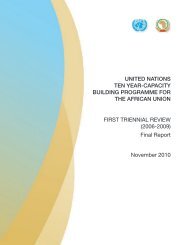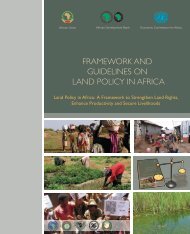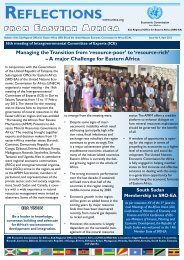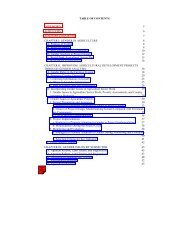A Decade of NEPAD - Economic Commission for Africa - uneca
A Decade of NEPAD - Economic Commission for Africa - uneca
A Decade of NEPAD - Economic Commission for Africa - uneca
You also want an ePaper? Increase the reach of your titles
YUMPU automatically turns print PDFs into web optimized ePapers that Google loves.
the <strong>Africa</strong>n business sector, and has fuelled speculation<br />
that <strong>NEPAD</strong> is a construct <strong>of</strong> <strong>for</strong>eign interests – or at<br />
best– an <strong>Africa</strong>n inspired, well meaning, initiative, that<br />
has been co-opted by more powerful <strong>for</strong>eign interests<br />
– that from an opportunity provision standpoint will<br />
do little to change the status quo.<br />
The conclusion drawn from the various analytic exercises<br />
undertaken since <strong>NEPAD</strong>’s inception is that although<br />
there have been some successful ef<strong>for</strong>ts to work together<br />
Strengths<br />
• The <strong>NEPAD</strong> brand still has resonance as a catalyst <strong>for</strong> intra-<strong>Africa</strong>n<br />
cooperation and expansion<br />
• Regional and continental expansion is in vogue and happening<br />
at a significant pace<br />
• There are still active <strong>NEPAD</strong> business bodies on the continent<br />
• <strong>NEPAD</strong> has been institutionalized within <strong>Africa</strong>n states and many<br />
multilateral institutions<br />
• Significant donor resources have been mobilized under the auspices<br />
<strong>of</strong> <strong>NEPAD</strong><br />
• The integration <strong>of</strong> <strong>NEPAD</strong> into the AU structure provides a chance<br />
to reintroduce the “new” <strong>NEPAD</strong> within all <strong>of</strong> the AU’s activities<br />
• The <strong>Africa</strong>n private sector continues to improve its capacity to<br />
aggregate and associate in organized business structures<br />
• <strong>Africa</strong>n enterprise is operating in an improving <strong>Africa</strong>n macroeconomic<br />
environment<br />
Weaknesses<br />
• Poor communication channels between <strong>NEPAD</strong> and the private<br />
sector, generally, and particularly with the <strong>Africa</strong>n private sector<br />
• <strong>Africa</strong> has weak structures <strong>for</strong> pan-<strong>Africa</strong>n organized business,<br />
and no universally recognized and/or supported umbrella business<br />
organ – which also impedes in<strong>for</strong>mation dissemination<br />
• In recent years <strong>NEPAD</strong> has been viewed as a declining brand from<br />
the standpoint <strong>of</strong> implementation efficacy – lack <strong>of</strong> visible results<br />
(at least from a private sector standpoint)<br />
• There are poor operational channels through which <strong>NEPAD</strong> can<br />
engage with the <strong>Africa</strong>n private sector<br />
• The <strong>Africa</strong>n private sector is comprised predominantly <strong>of</strong> SMEs<br />
and there are too few SME oriented programmes/ initiatives (and<br />
even fewer that target the in<strong>for</strong>mal sector)<br />
4. <strong>NEPAD</strong> and the <strong>Africa</strong>n Private Sector Today A <strong>Decade</strong> <strong>of</strong> <strong>NEPAD</strong><br />
initiated by the private sector and by <strong>NEPAD</strong>, much more<br />
ef<strong>for</strong>t is required to establish distinct and easily accessible<br />
mechanisms to involve the <strong>Africa</strong>n private sector in all<br />
aspects <strong>of</strong> the <strong>NEPAD</strong> process and programme – and to<br />
more fully leverage the <strong>NEPAD</strong> programme to benefit the<br />
varying segments <strong>of</strong> the <strong>Africa</strong>n private sector.<br />
A SWOT analysis is instructive in identifying current<br />
engagement factors that impact upon the <strong>Africa</strong>n private<br />
sector’s relationship with the <strong>NEPAD</strong> process:<br />
Opportunities<br />
• Significant growth over past ten years in intra-<strong>Africa</strong>n trade and<br />
investment and thus increased support and capacity <strong>for</strong> regional<br />
projects<br />
• Significant growth in interest in mutually beneficial engagement<br />
between the <strong>Africa</strong>n Diaspora and the government’s <strong>of</strong> <strong>Africa</strong><br />
• Many Diasporans in strategically important business and political<br />
positions to help reinvigorate <strong>NEPAD</strong> brand in the North and to<br />
communicate its accomplishments<br />
• Global financial crisis presents an opportunity <strong>for</strong> intra-regional<br />
introspection and collaboration focus, <strong>Africa</strong> has not been hit as<br />
hard and still has an enviable growth trajectory compared to many<br />
regions <strong>of</strong> the world<br />
• More private finance and ODA focused on <strong>Africa</strong> than at any<br />
time in history<br />
• Increase in the number <strong>of</strong> facilities and programmes available to<br />
support private sector growth in <strong>Africa</strong>, generally, and prospectively,<br />
to support <strong>NEPAD</strong> engagement, specifically.<br />
Threats<br />
• Global economic crisis may impede donors ability to make good<br />
on pledges<br />
• Delays or complications in AU/ <strong>NEPAD</strong> integration, which is only<br />
expected to be completed in 2011<br />
• If there is a systemic inability to adequately garner grass roots support<br />
(including from the <strong>Africa</strong>n private sector and civil society)<br />
<strong>for</strong> <strong>NEPAD</strong>, this will ultimately weaken the <strong>NEPAD</strong> brand and<br />
cause it to lose donor support<br />
• Multinationals/ <strong>for</strong>eign governments that would prefer <strong>for</strong> business<br />
to remain as usual on the continent may work against a more significant<br />
<strong>Africa</strong>n private sector role in the implementation <strong>of</strong> <strong>NEPAD</strong><br />
• National level corruption, political instability<br />
• Under-capacitated RECs<br />
• The EU’s <strong>Economic</strong> Partnership Agreements which feature regional<br />
aggregations <strong>of</strong> <strong>Africa</strong>n countries that have no correlation to the<br />
REC pillars <strong>of</strong> <strong>NEPAD</strong><br />
57







